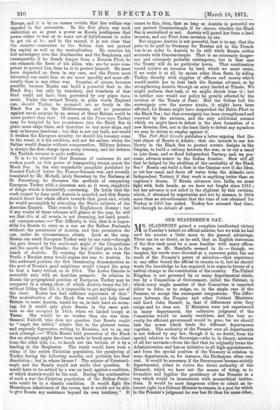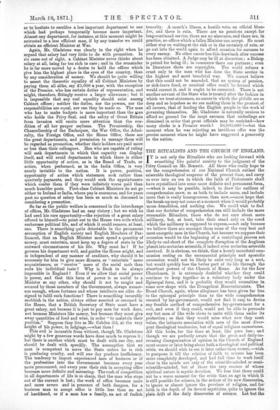OUR STATESMEN'S PAY.
ASR. GLADSTONE gained a complete intellectual victory .131 in Tuesday's debate on official salaries, but we wish he had used his success a little more to the general advantage. There can be no doubt, as he said, that an English statesman of the first rank must be a man familiar with many offices. To argue, as Mr. Mundella seemed to do — though, we imagine, his words were directed at a narrower point, the use made of the Premier's power of selection—that experience in any office bound the official to remain in it, lest he should waste the knowledge he has acquired, is to argue in favour of a radical change in the constitution of the country. The United Kingdom is not governed by so many departmental chiefs, but by a Committee of Government, called the Cabinet, to which every single member of that Committee is expected either to defer, or to resign, or, in the single case of the Premier, to accept the consequent resignations. The differ- ence between the Premier and other Cabinet Ministers, said Lord John Russell, is, that if differences arise they resign and he does not. If Ministers were not experienced in many departments, the collective judgment of the Committee would be nearly worthless, and the best se- curity for efficient government would be gone, for we should lack the nexus which binds the different departments together. The authority of the Premier over all departments is not defined by any law, though it is, no doubt, from his special relation to the Sovereign—who is, in theory, mistress of all her servants—from the fact that he originally forms the Administration, and has an initiative in all high appointments, and from the special position of the Treasury in relation to some departments, as, for instance, the Exchequer, often very real. It would be necessary, if the Government became strictly departmental, either to revive the direct authority of the Monarch, which we have not the means of doing, or to formulate and legalize the presidency of the Premier in a way which would be inconsistent with monarchical institu- tions. It would be most dangerous either to admit an in- herent right in a Cabinet Minister to remain in a post for which in the Premier's judgment he was less fit than for some other,
or to hesitate to sacrifice a less important department to one which had perhaps temporarily become more important. Almost any department, for instance, at this moment might be entrusted to a less efficient man, if by any transfer we could obtain an efficient Minister at War. Again, Mr. Gladstone was clearly in the right when he argued that salary had very little to do with promotion. In six cases out of eight, a Cabinet Minister never thinks about salary at all, being far too rich to care ; and in the remainder he is far more moved by a desire to hold the offices which give him the highest place in the eyes of the country, than by any consideration of money. We should be quite willing to assert the theoretic equality of all Cabinet Ministers by paying them all alike, say £5,000 a year, with the exception of the Premier, who has certain duties of representation, and might, therefore, fittingly receive a larger allowance ; but it is impossible that any real equality should exist among Cabinet offices ; neither the duties, nor the powers, nor the responsibilities are equal, nor can they be made so. The man who has to make budgets is more important than the man who holds the Privy Seal, and the safety of Great Britain from invasion will excite more attention than the con- dition of all her pauper asylums. The Premiership, the Chancellorship of the Exchequer, the War Office, the Admi- ralty, the Foreign Office, and the Home Office, these are the great departments, and permission to manage them will be regarded as promotion, whether their holders are paid more or less than their colleagues. Men who are capable of ruling will seek departments in which that capacity can display itself, and will avoid departments in which there is either little opportunity of action, as in the Board of Trade, or action, when performed, as in the India Office, is very nearly invisible to the nation. It is power, position, opportunity of action which statesmen seek rather than quarterly payments, and they would seek the appointments which confer them if they were infinitely worse paid than much humbler posts. First-class Cabinet Ministers do not go either to Ireland or India, where pay is enormous, and for years past no question of salary has been so much as discussed in considering a promotion.
So far as the public welfare is concerned in the interchange of offices, Mr. Gladstone had an easy victory ; but we wish he had used his rare opportunity—the rejection of a great salary offered to himself—to point out to the House two evils which embarrass political life, and of which it could remove, at least, one. There is something quite detestable in the permanent assumption of English society and English Members of Par- liament, that an English Minister must spend a quantity of money, must entertain, must keep up a degree of state in the outward circumstances of his life. Why must he ? If he governs his department well, and guides the House aright, and is independent of any manner of creditors, why should it be necessary for him to give more dinners, or " entertain " more acquaintances, or " receive " more of the social mob than suits his individual taste ? Why is Deak to be always impossible in England ? Even if we allow that social power is power, and that this form of power is as useful to a Minister as any other, why should it not be sought and secured by those members of the Government, always numer- ous enough, whose fortunes and whose intellects are alike de- signed to fulfil such functions? There is something incurably snobbish in the notion, always either asserted or assumed in the House, that a British Secretary of State must have a great salary, not because it is just to pay men for work done, not because Ministers like money, but because they must give away quantities of food and wine, in order "to maintain their position." Suppose they live as Mr. Cobden did, at the very height of his power, in lodgings,—what then ?
This evil is incurable from without, though Mr. Gladstone might by a few generous words have done much to repress it ; but there is another which must be dealt with one day, and should be dealt with speedily. The assumption that no man is competent to serve the State unless he is rich is producing cruelty, and will one clay produce inefficiency. The tendency to import experienced men of business or of the professions into the Government becomes every year more pronounced, and every year their risk in accepting office becomes more definite and menacing. The rush of competition in all departments of life is so sharp, that the man who steps out of the current is lost ; the work of office becomes more and more severe and in presence of both dangers, for a business man to accept office is little less than an act of hardihood, or if a man has a family, an act of foolish temerity. A month's illness, a hostile vote, an official blun- der, and there is ruin. There are no pensions except for ' long-continued service, there are no sinecures, and there are, in practice, no offices which a fallen Minister can accept. He must either stay on waiting at the risk or in the certainty of ruin, or go out into the world again to afford occasion for sarcasm to every enemy. No other career has this drawback after success has been obtained. A Judge may be ill at discretion ; a Bishop is petted for being ill ; in commerce there are partners ; even in literature there are copyrights. The world refuses a crust only to the man who has done the State service in the highest and most beneficial way. We cannot believe that this could not be amended, that no system of pension, or sick-leave fund, or nominal office could be devised which would correct it, and it ought to be corrected. There is not another servant of the State who is treated after the fashion in which we treat statesmen, no career in which the pitfalls are so deep and so hopeless as we are making them in the greatest of all careers, that of leading the English people in the work of governing themselves. Mr. Gladstone is naturally anxious to afford no ground for the inept sarcasm that underlings are dismissed in order that great officials may be enriched—how many clerks is a Premier worth ? 10,000,000 I—but thee moment when he was rejecting an invidious offer was the precise moment when he might have suggested a generosity to the nation.



































 Previous page
Previous page